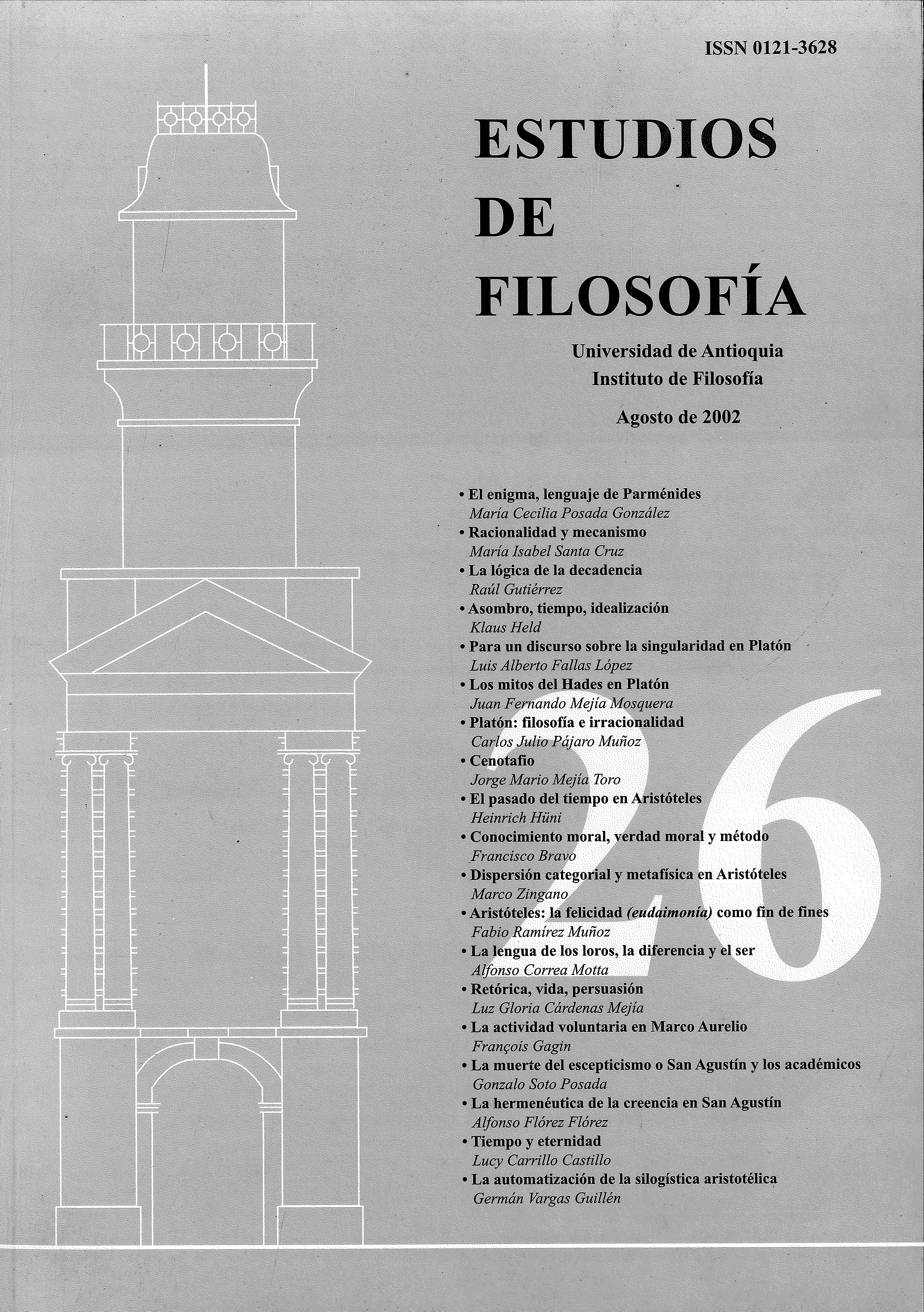Aristotle: happiness (eudaimonía) as the end of ends
DOI:
https://doi.org/10.17533/udea.ef.14976Keywords:
Aristotle, Happiness, End, Eudaimonia, EthicsAbstract
The purpose of this article is to deal with the theme of the ultimate end or happiness in Aristotle's ethics, and specifically in the Nicomachean Ethics, but distinguishing it into three themes that should not be confused: the end of politics as an architectural discipline, the end of good human life and happiness. Although these two ends and happiness, according to Aristotle, are the same, it could be said, using a very his expression, that "its essence is not the same." The separate treatment of these aspects can clarify more than one confusion or obscurity, and their articulation, once distinguished, allows ordering the main general themes of Aristotelian ethics.
Downloads
References
ANNAS, J. The Morality of Happiness. Oxford, 1993.
BARNES, J. (ed). The Cambridge Companion to Aristotle. Cambridge, 1995.
CANTO-SPERBER, M. Ethiques Grecques. Paris, 2001.
DURING, I. Aristóteles. México, 2a ed., 2000.
GAUTHIER, R. A. La morale d’Aristote. Paris, 1958.
GAUTHIER, R. A. y JOLIF, J. Y. L ’ Ethique ä Nicomaque. Introduction, traduction et commentaire, 2 vol., Louvain, 1958.
GUARIGLIA, O. La ética en Aristóteles, o la moral de la virtud. Buenos Aires, 1997.
_____________ La eudaimonía en Aristóteles: un reexamen, en: Methexis X, 1997, p. 83-104. DOI: https://doi.org/10.1163/24680974-90000273
HARDIE, W. F. R. Aristotle’s Ethical Theory. Oxford, 1968.
HUGHES, G. J. Aristotle on Ethics. Londres, 2001.
TOMÁS DE AQUINO. In Decern Libros Ethicorum Aristotelis ad Nicomachum Expositio. Turin, 1949.
YARZA, I. La racionalidad de la ética de Aristóteles. Pamplona, 2001.
Downloads
Published
How to Cite
Issue
Section
Categories
License
Copyright (c) 2002 Fabio Ramírez Muñoz S.J.

This work is licensed under a Creative Commons Attribution-NonCommercial-ShareAlike 4.0 International License.
Authors who publish with this journal agree to the following terms:
1. The Author retains copyright in the Work, where the term "Work" shall include all digital objects that may result in subsequent electronic publication or distribution.
2. Upon acceptance of the Work, the author shall grant to the Publisher the right of first publication of the Work.
3. The Author shall grant to the Publisher a nonexclusive perpetual right and license to publish, archive, and make accessible the Work in whole or in part in all forms of media now or hereafter known under a Creative Commons Attribution-NoCommercia-ShareAlike (CC BY-NC-SA 4.0), or its equivalent, which, for the avoidance of doubt, allows others to copy, distribute, and transmit the Work under the following conditions: (a) Attribution: Other users must attribute the Work in the manner specified by the author as indicated on the journal Web site;(b) Noncommercial: Other users (including Publisher) may not use this Work for commercial purposes;
4. The Author is able to enter into separate, additional contractual arrangements for the nonexclusive distribution of the journal's published version of the Work (e.g., post it to an institutional repository or publish it in a book), as long as there is provided in the document an acknowledgement of its initial publication in this journal;
5. Authors are permitted, and Estudios de Filosofía promotes, to post online the preprint manuscript of the Work in institutional repositories or on their Websites prior to and during the submission process, as it can lead to productive exchanges, as well as earlier and greater citation of published work (see The Effect of Open Access). Any such posting made before acceptance and publication of the Work is expected be updated upon publication to include a reference to the Estudios de Filosofía's assigned URL to the Article and its final published version in Estudios de Filosofía.















